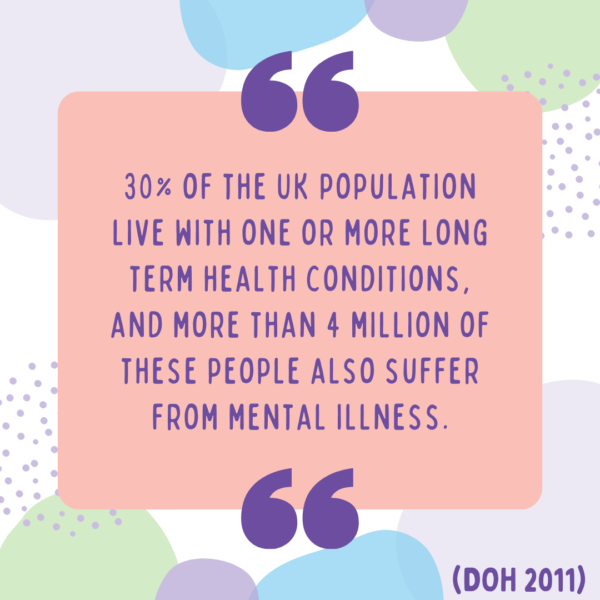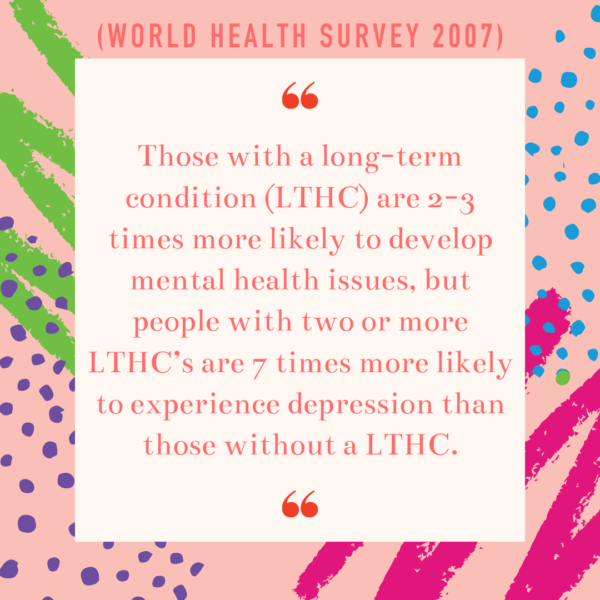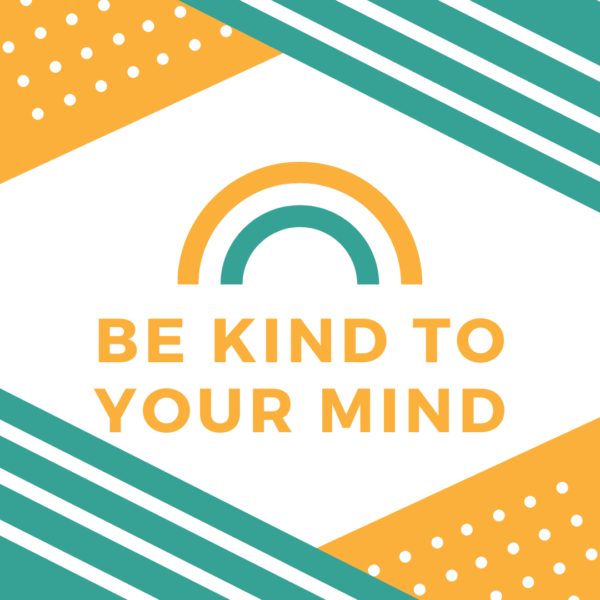
* This post is written by one of our volunteer content creators. *
As we continue to see life around us continue to resemble what is now known as the new ‘normal’, we’re bound to be experiencing a complex array of emotions. Perhaps relief, perhaps dread, maybe even excitement - but as someone living with a chronic illness, I can say with utter certainty that I’m feeling overwhelmed, burned out, and frustrated with the entire situation. But what can we do about this?
In this blog post, I will be exploring how people with chronic illnesses can attend to their mental health. But first, some quick statistics regarding the relationship between chronic and mental illness. (Mental Health Foundation, 2020)


Those living with chronic illnesses are bound to experience prolonged, or even life-long stress regarding their health, future and quality of life. All whilst grieving for the life they once had, accepting new life goals, and fighting to be accommodated. Because of this, our health suddenly becomes our full-time job, in which we get no breaks, holiday or pay. It’s incredibly hard and non-negotiable, but that doesn’t mean we can’t still find joy in life, it just may take time to discover different forms of happiness. Best of all, we eventually learn to recognise and appreciate the smallest of victories, which most able-bodied people simply overlook.
But despite these positive outlooks, people with long term health conditions will sadly always face obstacles that most people never have to comprehend or experience. All whilst mutual challenges are complicated further purely because of our illness. Something the coronavirus pandemic has highlighted, and as helpful as this may be in some instances, it can also be a detriment.
Many vulnerable people, myself included, feel as if those with underlying health conditions have been disregarded during the global health crisis. All of which is understandably difficult to accept and can leave us feeling invalidated. We’ve also found it incredibly hard to watch the news and see the ever-changing death toll; rising case numbers and impacted health services, because we don’t have the reassurance of saying we’d be “fine” if we caught the virus - even though this belief is disillusioned and shows a sense of complacency. Leaving those of us in the vulnerable categories fearing over the fact we could easily become a statistic.
With this in mind, it’s no surprise if you are feeling trepidation about eventually integrating back into society. After all, we’ve been unable to see anyone or anything for a long time. So if you are well enough to do so, I think it’s important to get back in touch with the outside world, as we can end up despising the same four walls! Just remember that mental wellness starts from within, so sitting outside now and again, or enjoying virtual experiences is not the singular solution. But rather a viral part in a collection of actions that are unique your lifestyle, care requirements and personal needs.

Mindfulness is a therapeutic technique defined as a mental state, which is achieved by focusing one's awareness on the present moment, while calmly acknowledging and accepting one's feelings, thoughts, and bodily sensations. If you’re like me and suffer from anxiety, find yourself overthinking, feeling disconnected from your environment or that your mind is racing, then the practice of mindfulness is bound to help.
Everyone’s definition of what constitutes self-care is different, but it’s definitely not glamorous. It’s self-preservation. Looking after ourselves is a necessity, even if this means we have to fulfil these needs with assistance. By accepting help and supporting our physical health, we are engaging in self-care. Making sure we’re taking our medications on time, making sure we’re ordering our supplies from the pharmacy on time, using pain management strategies to reduce suffering, getting as much sleep as we can, taking time for ourselves, and practising the art of saying no if we feel like we’re taking on too much.
That being said, taking the time to do things that make you feel good inside is just as important as physically managing your health condition. Even the little things can bring the most comfort and joy in difficult times. Such as listening to music, watching a favourite film, wearing new cosy pyjamas or getting someone to paint your nails!
You aren’t weak for asking for help, and you aren’t weak for feeling weakened. In fact, asking for help, acknowledging how you are feeling, and that you need the help is a strength. This goes for both physical and mental health support; because if we don’t ask for help in navigating daily life as a less-abled or disabled individual, then it’s certainly going to be a detriment to you. When we ignore the signs that we are overdoing it, powering through is never the option, as a physical and mental toll will be taken. If you feel like you are struggling with your mental health, please talk to someone. You matter and are worthy of support. As someone who has been hospitalised in the past for a mental health issue, I can say from the bottom of my heart that if I had any advice for my younger self, I would have stressed the importance of reaching out and that there is no shame in suffering from mental illness. You certainly aren’t lesser for having one, so please check out the links below! You can also leave a comment or message me directly via Instagram!
Mental distress is hard, there’s no doubt about that. It can negatively affect our relationship with ourselves, but even when this is the case, we have to talk to ourselves with the same support and consideration that we would show someone we love. So whenever you feel stressed or anxious, have negative thoughts about yourself, or your abilities, practice affirmations.
• Anxiety UK •
• CALM - Charity Campaign •
• Mental Health Foundation •
• Mind •
• NHS Mental Health Support •
• No Panic •
• Young Minds •
Hi, I'm Lauren and I have been living with a collection of disabilities for the past 8 years. I initially had a passion for teaching children with special needs, but my health prevented me from pursuring my dream career. Despite this, I now love nothing more than sharing my experiences to help other people living with disabilities.
Hi, I’m Lori and was diagnosed with Ehlers Danlos Syndrome and a family of co-morbid conditions which has made life highly complex. However I constantly aim to make life as ‘normal’ and fulfilling as possible - and through this, I discovered the benefits of writing about my journey.
 GET IN TOUCH
GET IN TOUCH


